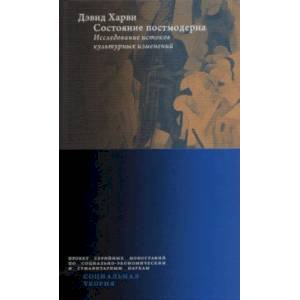The condition of the postmodern. Study of the origins of cultural changes
Please sign in so that we can notify you about a reply
The term "postmodern" is one of the most complex and contradictory in the social and humanities. For several decades, different thinkers and scientists have offered their own interpretation of this concept. The most famous social geographer David Harvey is one of them. In his main book, Harvey explains what meaning the term “postmodern” as a state of relevant culture implies, and shows that the logic of capital is behind tangible and dynamic changes in cultural life. The scientist claims that the origins of cultural changes are ultimately in the economy. In the course of his study, he traces the socio-economic and conceptual history of modern (from education to the present day) and how the transition from Art Nouveau to postmodern in art, urbanism, literature, architecture, and cinema was carried out. Harvey proves that spatio-temporal compression has occurred for several centuries and by the 1970s it became a decision of the crisis of overcoming capital. Thus, from modernist Fordism, a transition to postmodern postfordism occurred, defined as a "flexible accumulation". Although Harvey wrote this book back in 1989, he did not abandon his ideas, and the events that have occurred since then proved his case.
The book is considered one of the most important sources in the social and humanities and will be interesting to a wide circle of readers
The book is considered one of the most important sources in the social and humanities and will be interesting to a wide circle of readers
Author:
Author:Harvey David
Cover:
Cover:Hard
Category:
- Category:Education & Teaching
- Category:Politics & Social Science
- Category:Reference books
- Category:Social Science & Politics
Series:
Series: Social theory
ISBN:
ISBN:978-5-7598-2369-8
No reviews found
